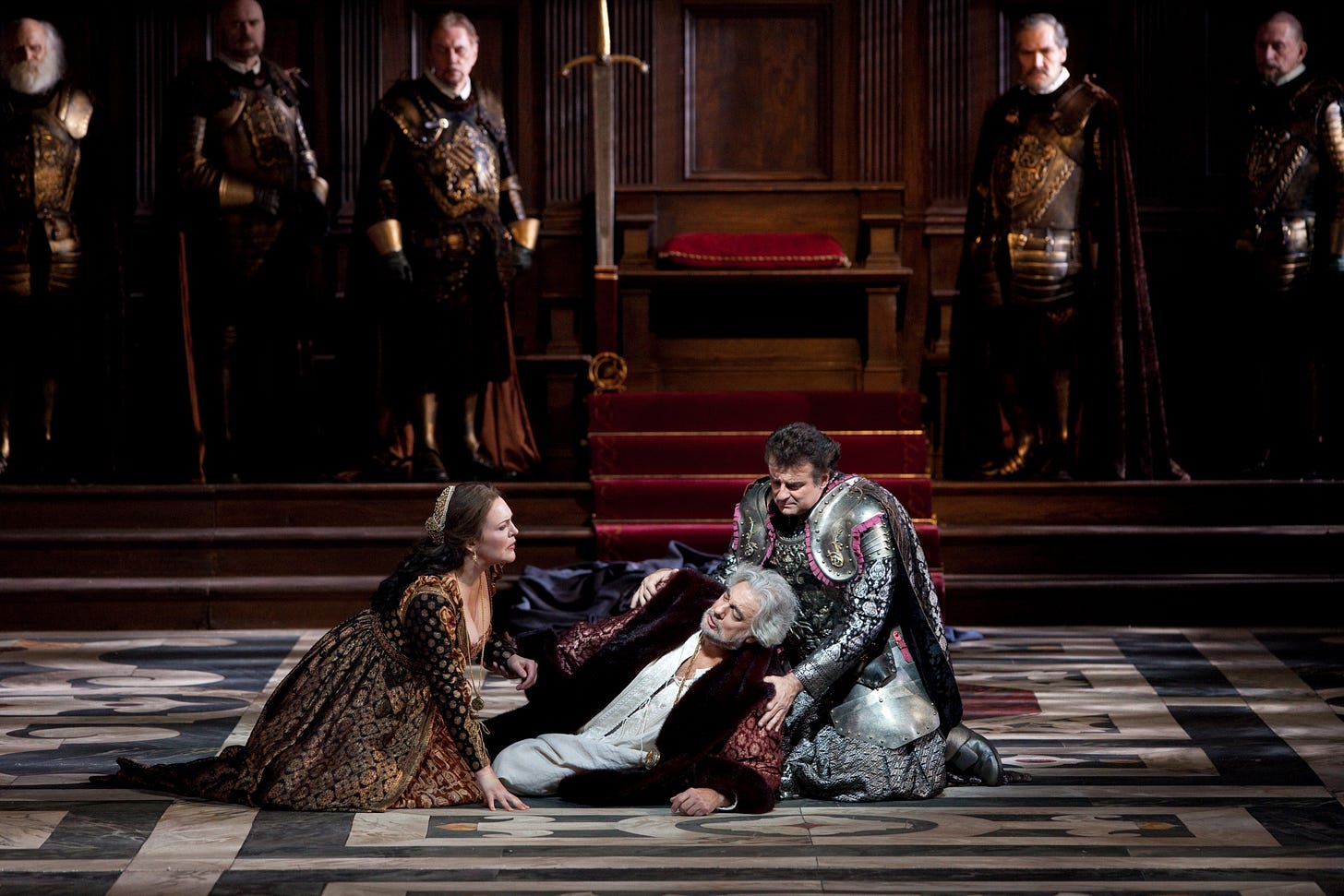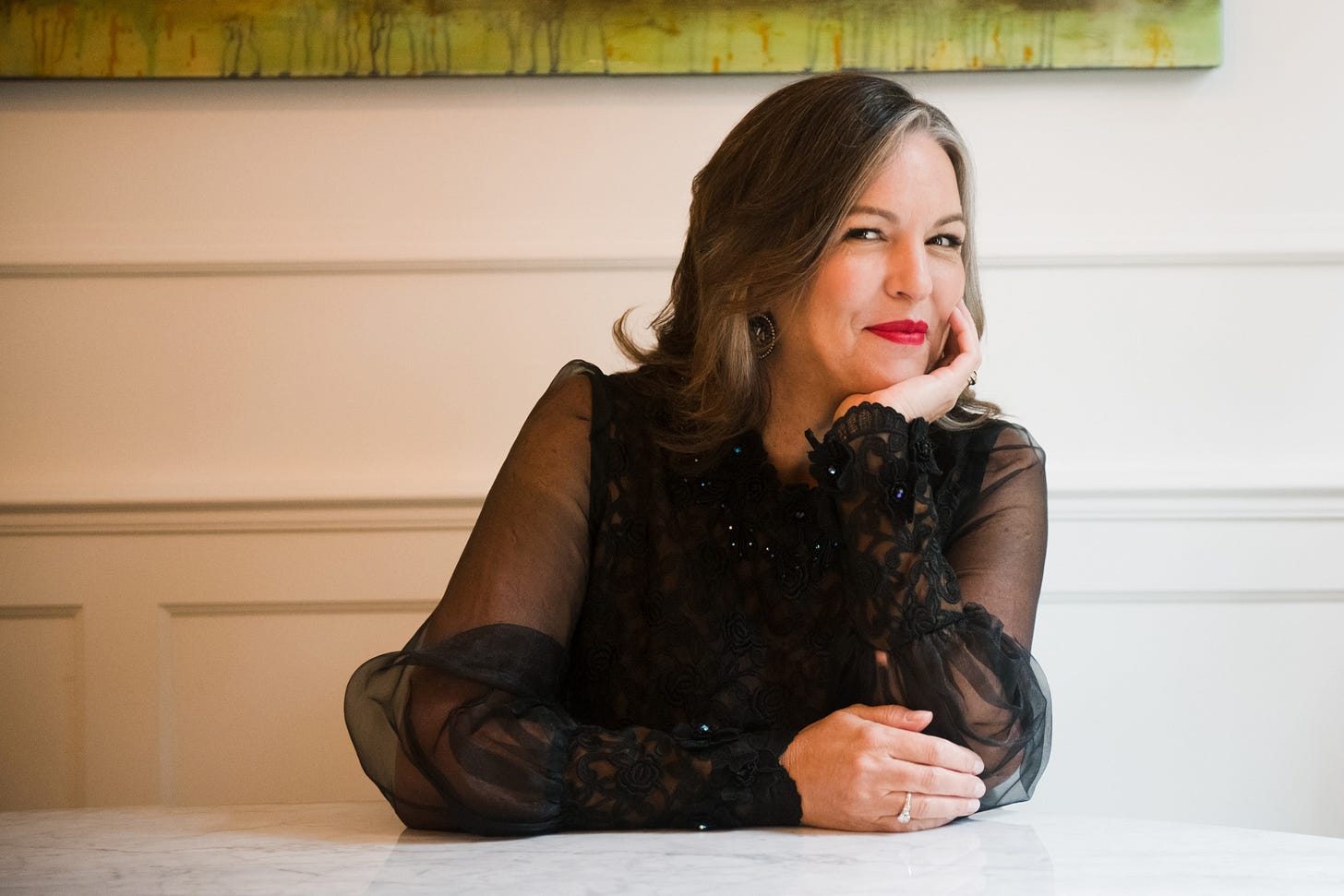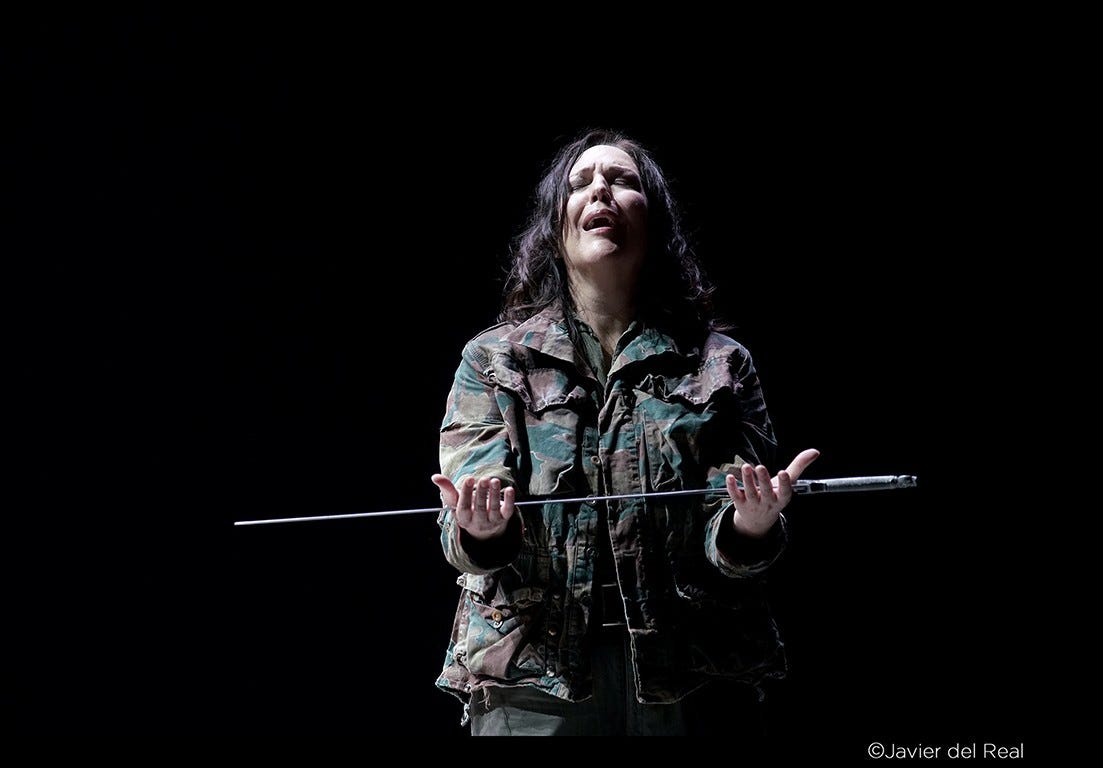If I relied on Canadian media for arts news, the new Adrianne Pieczonka recording with the NAC orchestra would have passed me by entirely. It’s the influential Franco-Belgian online magazine ForumOpera (former Macron speech writer is a founding editor) that brought the Q&A about Pieczonka’s new Clara Schumann & Brahms album to my Twitter timeline. It’s how I found out that she had decided to call it a singing career – covid only sped up the decision – and that she would focus on being the head of the vocal department at the Glenn Gould School, with only the occasional singing project in the diary. Ah, I thought: end of an era. While Canada sends into the world cohort after cohort of superbly trained operatic talent – is the district around the Frankfurt Opera called Little Canada yet? – fewer singers manage to sustain such geographically wide-ranging careers as Pieczonka’s for so long. Munich, Vienna, the Met, Madrid, London, Paris, Bayreuth – there have been years in her diary with all these opera houses in close succession. Her last engagement before the Mayhem was in February 2020 in Madrid, as Sieglinde in Robert Carsen-directed Walkyrie. In one of her outings in the Spanish capital she bought a guitar, and took it back to Toronto – not having any inkling that that was going to be her primary musical engagement in the next long while. As all her contracts got cancelled one by one in the following months, she took up guitar in earnest, and there was always the living room piano to turn to. As the pandemic dragged on, she got a jazz trumpet and booked herself for some classes. As is the case with a lot of musicians, music was a physical need.
“It had a strange beauty, this period,” she tells me when I ask her what the last two years have been like. It was a rare sunny day in April so we met in the back yard of her house in Annex. A lot of trips to the cottage in Georgian Bay, she says, a lot of cooking, and the two cats were a godsend. Teaching at the GGS resumed one-on-one with masking and distancing at the empty Mazzoleni Hall, and that was energizing. Her wife Laura Tucker bought a kiln, which now lives in their basement, and proceeded to create some extraordinary ceramics. This period was probably hardest for their teen, who was confined to online schooling and unable to socialize with friends.
What would she say to the young people starting out as opera singers now, after these two devastating years? “I think I’m one of the last generation that can have the sort of tunnel-vision opera track. Undergrad, opera school or Masters, and then off to Europe. I immediately got a fest job in Vienna.” (Fest is an ensemble-type contract which keeps the singer tied to one house where they are cast in whatever productions are being programmed in any given season.) Did she ever have seconds thoughts about leaving Canada? “Not really, because I applied to be in the COC Young Artist program, and only got into the Apprentice tier, not the Ensemble. As an apprentice, you get to be in the chorus, you get a bit of money, and you may understudy once or twice. OR I could go to Europe. So I went to Vienna. I didn’t think much about it. I loved German in school, I had the wanderlust, I had a lot of confidence.” It wasn’t a bed of roses – fest contracts are intense – but she stuck it out. A lot of young Canadian singers today are taking a different approach. “Let’s take Danika Loren, for example. Danika for my money could have a one-track opera career but no, in addition to singing, she’s a composer, writing some of her own work, maybe directing… she’s what is now known as portfolio artist, doing many things at once.” Creating their own opportunities? “That’s right. I didn’t have to create my own opportunities because there were enough of them.”
Emily D’Angelo is someone on a more traditional operatic path, she notes. Not only is she getting A-list opera house engagements around the world but she’s also signed an exclusive Deutsche Gramophone contract, something that few singers still get to do, as recording industry is all but collapsed, especially its classical branch. She curated her own CD to include mostly songs from contemporary composers. “There are some extraordinarily talented singers who are multi-branching… Ema Nikolovska, that girl, holy sh*t. An incredible artist.” She’s already moved abroad, I remind her. “Yes, she’s in Germany now… Or we have a Rebanks fellowship artist at the GGS, Jaclyn Grossman, who’s been assembling and researching with her pianist a songbook of works from the Polish ghetto that have never seen light of day. And she’s a young-dramatic soprano, in her late 20s, she’s wanting to be one of the Valkyries, but covid put paid to that for now and she is doing her own programming and research in the meantime.” Another thing in young singers’ favour is the opening up of the Chinese and Korean classical music markets: this was not in the books when Pieczonka was staring out in late 1980s.
Is that the future of opera singing in Canada, I wonder? Singers will have to become singer-songwriters of the Joni Mitchell type… like troubadours, going from city to city? Which would be even more precarious than the current situation. “I think it can be a highly creative life, but yes it’s highly precarious. My model of opera-only track is pretty well done. When I came on the scene, it was the final stage of the golden era of recording, the Pavarotti-mania, stadium concerts and opera on public television. That’s died out.” Is anybody still buying recorded music? DVDs of opera productions yes, but CDs and the revived LPs? D’Angelo’s first album looks great but her generation just never buys music. “I don’t even know how it works any more,” she responds, diplomatically. “Jonas Kaufmann and a few stars still produce CDs regularly…” But who is buying the stuff? “I’m not sure… Everybody’s streaming or watching YouTube,” she concurs. We grow silent and listen to the birds for a bit.
II.
But why retire at 59 when a lot of dramatic sopranos continue singing well past sixty, I ask her. “I’m not quite the dramatic soprano – I managed the jugendlich-dramatischer (the young-dramatic) roles like Sieglinde and Chrysothemis just fine, but I was more happy in Strauss as Marschallin or Arabella. I am more lyric.” Bit more on the Renee Fleming side of things? “Renee is amazing, she’s working now in her sixties, she has an extraordinary technique. I was actually getting insecure technically, my nerves were getting worse, and I felt my voice shifting. The ease in my top range was suddenly not immediate.” Ah but that’s when the sopranos discover the mezzo repertoire, no? “Ha, well… There’s Judith from the Bartok Bluebeard Castle perhaps on the horizon, but the contract is not yet signed so I can say no more. Judith has a high C after all.”
Pieczonka is returning to Vienna soon to sing a duet at a gala for a former teacher, and to work with young artists. She regularly gets phone calls for galas and master classes (in July last year she found herself at a farewell gala in Munich after Anja Harteros fell ill, and sang the Marschallin monologue which is, fittingly, about the passing of time). “I’m knowing my limits… and my nerves. I am an A-Type personality and wound quite tightly. I admire people who are chill and full of calm confidence. Renee is like that, and so is Joyce DiDonato, whom I went to see perform last night. I, on the other hand, am always in doubt. And probably overly sensitive.”
There are certainly twinges of sadness sometimes about the past career, she admits, but there are other rewards to be had. “There is nothing like singing opera. It feels amazing. It’s a gift.” However, “it’s time to pay forward now with young singers at GGS. I get a lot of satisfaction from it. On Thursday one of my students won a competition, and that’s a new kind of pleasure.”
Her teacher in Vienna, she says, quit from one day to the next -- and Brigitte Fassbaender too. “I think that’s like cutting off a limb, I don’t think that’s good. Doing it step by step… is better. Gradually, things will fall away in a natural way.” Fassbaender quitting so suddenly remains one of the mysteries of the twentieth century opera; is there a story behind it? “I know Brigitte a bit personally and we had many conversations. She says that the main reason was menopause. Her voice was getting erratic, she told me – doing well in rehearsal but by five o’clock she’d have to transpose to different keys! So I presume the hormones got out of whack and affected the cords. Each woman will have her own hormonal profile… One of the things I’m reading is the Toscanini biography by Harvey Sachs. In Toscanini’s day, when you’re about 40, soprano’s pretty well done. If you sing aged 44, you were old!”
Now, at least the heavier, more dramatic voices, are continuing into their sixties. Sondra Radvanovsky and Christine Goerke are in their fifties, Nina Stemme will be 60 next year and “they’re going for it.. those dramatic voices are probably more capable of singing till later. Three decades ago there was Birgit Nielsson.”
Do you remember, I ask her, the Winterreise that you sang at Mazzoleni a few years back, which I rhapsodized about in the Wholenote magazine? A singer at the height of her powers. “Ah thank you. I still sometimes sit down and play my favourite songs, just for myself. In December ’20 I did Erlkönig with the COC Orchestra and Johannes Debus at the Koerner, which was streamed live. Erlkönig with orchestra was thrilling.”
III.
“Have you seen the article about Bill Richardson in the Globe the other day?”, she asks. I have, and I’ve enjoyed it. “He’s stacking shelves and was a dishwasher at some point, and he really loves it. The person I really like is David Sedaris, who picks up garbage.” Sedaris, who now lives in England, is known to choose an area close to his house and make it his duty to clean the litter from it every day. “I think there’s something zen about it. When covid hit, I did litter picking on our street.” No way! “Yes, and it’s very satisfying. Those are the kinds of things that are mindful, and that help the neighbourhood. There’s a little school there and I would do it a lot by the school. It’s something to do. You make yourself useful. And working at Whole Foods, I see there’s beauty in that. You clock in, you come home tired – he said it helped him combat the loneliness he was experiencing -- I think it’s beautiful.”
Being in the moment, and being accepting of changes, she says she’s still working on that. “I’m very ambitious, and driven.. I suppose I’ll admit it, the Elektra that I did at the Met, that was in Aix-en-Provence, the Chéreau production that went around the world, is now back at the Met with Nina Stemme and Lise Davidsen. The press was all OMG this is the dream team for the ages… Last Saturday I thought, well, it’s coming up to one o’clock: do I listen to it? No I’ll go out to do some yard work. I love Nina and the cast is wonderful. But I’m not there yet, to listen to it all without the twinges of regret.” But you guys of the original cast are on DVD, Evelyn Herlitzius as Elektra, Waltraud Meier as the mother: that original production is one for the ages, I object. That is one exceptionally coherent production of Elektra. I watched all the bonus interviews on DVD and Chereau spends a lot of time defending her character, Chrysothemis. She is the everyman/woman in the production. “Well OK yes,” she concedes. “Sometimes an old video of mine pops up when I’m on YouTube and I will watch it and I’d think Wow, I really did that. Twenty years ago, the Don Giovanni with Muti from Vienna – I was listening to that and thinking, this is actually good.”
What would be the milestones, when you look back? “Bayreuth was a milestone, doing the Ring Cycle in 2006 and the Bayreuth debut. I loved my two years at Glyndebourne, that’s a unique festival. (I was in Deborah Warner’s Don Giovanni and in Arabella next year.) I’ve sung at La Scala and the Royal Opera House. The Met is hard to beat. I worked a lot in LA in early 2000s which I loved. The Verdi Requiem at the Stade de France, the football stadium 60 000 people. And Munich and Vienna are my spiritual homes.”
Was it hard to be out in Europe? You sometimes hear people say it’s easier to be a gay singer in Canada and US. “My first answer is No. I’ve never been aware of ever losing a job or having any kind of prejudice against me due to my sexuality. To my face, I was welcomed, I had a great career with a lot of opportunities.” And I think you were out immediately, no? “Not immediately. In Vienna early on not very much, as Vienna is more traditional and Catholic and conforming so it took me time. I moved away in 1995. I could have stayed in Vienna and had a nice base and earn a great living but I couldn’t see myself growing old there. It wouldn’t have been my first choice. Even into my early 30s I was not exactly talking about it. When I came back I remember doing a lifestyle interview with the Globe and I got asked if I was seeing someone; I said yes I’m seeing someone new. We left it at that; the journalist said in the article “she’s seeing someone new but she won’t divulge his name”. I was so embarrassed! because I’ve always been out to family and friends. But that was my bad. Had I really been comfortable, I would have said it’s a woman. And with the birth of a child, Laura and I decided we must be completely transparent. We always say “wife” not “spouse”, we own that term. But I think we’re still the other. You sometimes get reminded of it.”
Pieczonka grew up in Burlington in a Polish family that was quite Catholic, but her family were generally supportive after she came out. Was she out from the very beginning? “Well my mother found out when I was 21. She suspected something and read some letters of mine (yes, a privacy breach!) and called me to come home to discuss it. It was a relief, in all honesty. I knew from a fairly early age, and was living this out with young girlfriends, and at university, so at 21 I could finally come out and say yes it’s true. I was relieved. There were tears, but everybody got used to it.” There weren’t many out women in culture at that time, right? That must have taken some courage? “I think it was the confidence of youth… But not always. I remember going to events in Vienna with my girlfriend and being worried about seating requirements. How do you introduce your girlfriend in Vienna, do you say this is my good friend? There were many awkward after-parties!”

For those unfamiliar with Adrianne Pieczonka’s work, or with opera in general, this Puccini album is a good intro to her incredible high piani. Her Salzburg Marschallin is a good next stop. A TPL card owner can log on to the Naxos Music Library and explore the rest; there’s practically everything, for free. Except the DVDs/BluRays of opera productions. Let’s keep buying those.




